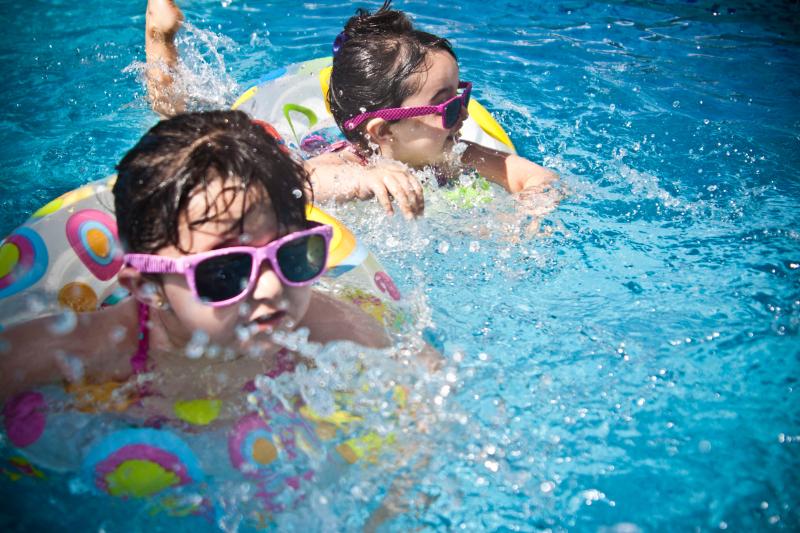
from WRAL GoAskMom blog
Summer can be rough on our eyes - with the chlorine in the pool, sandy eyes at the beach and the glare of UV rays.
I checked in with Dr. Laura Enyedi, associate professor of ophthalmology and pediatrics at Duke University, to learn how we can help keep our kids' eyes safe during the summer months.
Skip the sparklers
Sparklers and bottle rockets might be part of your July 4 celebration, but each year thousands of people, often children, face severe injuries from them.
According to one international study, 35 percent of fireworks victims are age 15 and under. And victims often are the people watching the explosions.
"Enjoy professional fireworks," said Dr. Enyedi, who practices at the Duke Eye Center of Cary and the Duke South Durham locations.
"A lot of people think sparklers are fun and safe for children," she said. "They are not. Those sticks ... can burn right through a cornea and the sparks can cause severe eye injuries and burns to the skin. And things like bottle rockets can cause explosions, which can cause severe eye injuries and cause you to lose an eye."
Young kids, for instance, may hold that sparkler very carefully when it's shooting off little flames. But, she said, they may not realize that the sparkler is still hot when the sparkle stops or that the firework may still be dangerous.
"I remember a child I took care of who had had a bottle rocket," she said. "The kid put it in a bucket and then looked into the bucket to see if it had exploded. And it exploded in his face. It was a very serious injury."
Don the sports goggles
It may be a hard sell for older kids who have spent their baseball careers without wearing protective eyewear but it's important, Dr. Enyedi said.
"We know that for children in the tween and teen age group, the most common reason for them to lose vision or lose an eye is from sports-related issues," she said. "Almost all would be prevented with proper sports goggles."
Popular summer sports such as baseball and tennis, where the game is played with smaller balls, can post more serious risks. Those smaller balls can more easily fit into the eye socket. But other athletes, including soccer and basketball players, also face potential injuries.
Dr. Enyedi recommends putting sports goggles, which you can find at most any sporting goods store, on kids when they are young.
"The younger they are the more likely they will continue to wear them when sports play gets more physical and the balls get faster," she said.
Be prepared for red eye at the pool
The chemicals in the pool, sunscreen and the sun can be a triple threat for eyes, causing irritation and red eyes. The pool water also can wash away your natural tears, which can cause some irritation and dryness aftera day of splashing and swim team practice.
"It's not uncommon for kids to have red eyes when they are in the pool all day long," she said. "It's not usually dangerous."
Swim goggles can help - reducing contact with the chemicals in the pool.
"An artificial tear drop can be soothing if they are irritated or drying feeling," she said.
Another pro tip: If your child wears contacts, be sure they take them out before they swim anywhere - a pool, river, pond, lake or ocean. The contact lenses can trap chemicals and other organisms, which can lead to dangerous infections.
"Never wear contact lenses swimming," she said.
Get sunglasses for everybody
"Over a lifetime, UV exposure is correlated with the development of cataracts and macular degeneration," Dr. Enyedi said. "So the more UV exposure over your lifetime, the more likely you will have those problems when you get older. UV protection is important for children as well as adults."
You don't have to spend gobs of money to get a proper pair of sunglasses for the entire family. You'll want sunglasses that have both UVA and UVB protection. And Dr. Enyedi said even the most inexpensive sunglasses have that.
Another option: Hats with a brim can help to reduce glare and sun exposure too.
Protect eyes from sand
This was a constant struggle at the beach when my kids were much younger. They'd build massive sand castles, wipe their face with their hands and get sand in their eyes.
Encourage blinking and tearing to help clear it out, Dr. Enyedi said. You also can help the eye along a bit.
"Holding onto the lashes, pull the upper lid down to wipe over the eye to produce more tears to flush things out," she said. "... You can use an artificial tear drop to help wash it out or could even rinse it with tap water. But your own natural tears are an effective solution."
If things don't improve in an hour or two, Dr. Enyedi recommends seeking medical attention to ensure there's nothing trapped in there or the cornea isn't scratched.
This originally appeared on the WRAL Go Ask Mom Blog